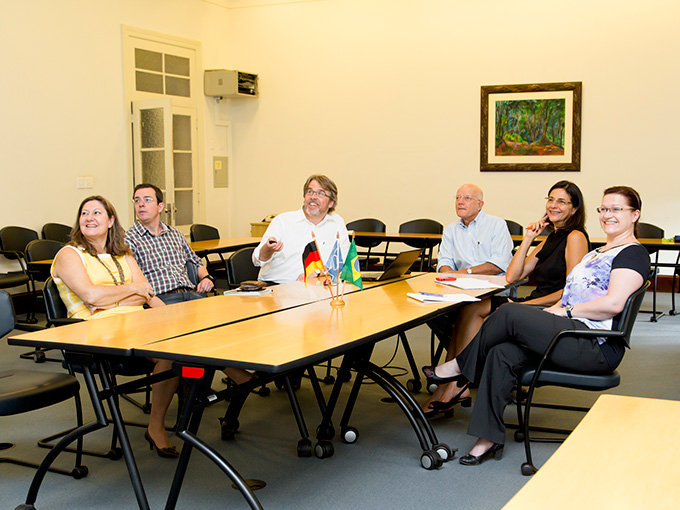On March 1st, 2014, a delegation from the University of Hohenheim, Germany, visited Luiz de Queiroz College of Agriculture (USP/ESALQ) to launch an academic cooperation network between the University of São Paulo (USP) and the German institution. Andreas Pyka, vice-president for international affairs, and Gabriele Erhardt, international affairs project coordinator, both from the Univeristy of Hohenheim, were welcomed by ESALQ vice-dean and president of the International Relations Committee, Marisa Aparecida Bismara Regitano d'Arce, and representatives from all ESALQ faculties.
According to Pyka, both universities will develop research on Bioeconomy. “Bieconomy encompasses sectors of the economy that use biological resources and bio-technological processes to produce bio-based goods and services.” The German professor also says that the concepts and applications of Bioeconomy are very broad. “This means that almost all areas relevant to Bioeconomy are related to: sustainability; reducing the use of fossil fuel products; changing consumer behavior; shifting from traditional industrial processes to Bioenergy; and policies that enable this change,” he says.
In addition to fostering this international academic cooperation to be funded by the German Academic Exchange Service (Deutscher Akademischer Austaisch Dienst, DAAD), this visit aimed at setting up the agreement with USP. According to Marisa d’Arce, the Faculty of Pharmaceutical Sciences and the Institute of Biomedical Sciences of the University of São Paulo have already initiated a partnership agreement with the German university. “Both universities have already demonstrated interest in this cooperation program. In addition to ESALQ, this agreement will include all of the faculties within the University of São Paulo. The vice-dean added that the Bioeconomy concepts include all activities developed at ESALQ. “Agriculture is a biological activity that aims at sustainability, profit, and productivity,” she says.
Hohenheim & ESALQ
Pyka explains that they are currently interested in developing partnerships for research in very broad fields, encompassing several research fields found at ESALQ. “Next, we will dig into several of these fields, according to the potential that each one has to take us to the paths we consider to be the most correct according to the Bioeconomy concepts.” He adds that internationalization is critical for the Bieconomy development. “The paths that can be taken within Bioeconomy are different for each country, according to their specificities. Furthermore, there is much to be shared from the experiences between partner countries.”
According to Pyka, DAAD will foster internationalization by providing funding for international mobility throughout the program, aiming at achieving high-standard outcomes for the involved institutions through the development of research projects. “I believe this will be an excellent opportunity for us, teachers and researchers from both universities, as we now have the opportunity of meeting each other and conducting joint research projects.” He points out that because Bioeconomy is such a broad field, there will be very good opportunities for developing research and obtaining project funding.
According to Marisa d’Arce, two events have already been planned for this year, bringing together representatives of ESALQ in Germany. “The first activity consists of a summer course to be held at the end of September, when an ESALQ faculty member will represent us. This is a three-week course, and our faculty member will be in charge of activities developed during one of these weeks.” The second activity is a Bioeconomy conference, which will also be held in Germany. “I will attend this conference together with other ESALQ faculty members,” she concludes.
Visit Schedule
In addition to a welcome session helded at ESALQ Dean’s Office, the visitors had a meeting with ESALQ faculty representatives at Ceres Room (Main Building), when the University of Hohenheim was presented to the attendees. The international mobility program opportunities offered to professors, researchers and graduate students were presented at the Professor Urgel de Almeida Lima Auditorium, in the Agri-food Industry, Food and Nutrition Department.
During the afternoon, the German delegation visited the Economics, Management and Sociology Department, where they gave an additional lecture.


